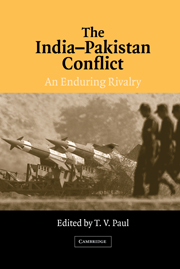Book contents
- Frontmatter
- Contents
- List of figures and tables
- Notes on contributors
- Acknowledgments
- Map: Jammu and Kashmir
- Part I Introduction
- Part II Theories of enduring rivalry and the South Asian conflict
- 2 Theoretical specifications of enduring rivalries: applications to the India–Pakistan case
- 3 The India–Pakistan conflict in light of general theories of war, rivalry, and deterrence
- 4 The India–Pakistan rivalry: prospects for war, prospects for peace
- 5 Realpolitik and learning in the India–Pakistan rivalry
- Part III Roots of the India–Pakistan conflict
- Part IV Conclusion
- Index
5 - Realpolitik and learning in the India–Pakistan rivalry
Published online by Cambridge University Press: 30 November 2009
- Frontmatter
- Contents
- List of figures and tables
- Notes on contributors
- Acknowledgments
- Map: Jammu and Kashmir
- Part I Introduction
- Part II Theories of enduring rivalry and the South Asian conflict
- 2 Theoretical specifications of enduring rivalries: applications to the India–Pakistan case
- 3 The India–Pakistan conflict in light of general theories of war, rivalry, and deterrence
- 4 The India–Pakistan rivalry: prospects for war, prospects for peace
- 5 Realpolitik and learning in the India–Pakistan rivalry
- Part III Roots of the India–Pakistan conflict
- Part IV Conclusion
- Index
Summary
Introduction
The India–Pakistan rivalry has been punctuated by recurring militarized crises, four of which have resulted in wars. The enormous costs of this dysfunctional relationship have been obvious since the blood-letting that accompanied partition; today there is the added risk of a nuclear catastrophe. Why cannot the two sides learn to manage their disputes without the risk of war? Will they ever be able to transform their relationship from a competition to achieve relative gains to obtain the absolute gains of peace? Learning, whether functional or dysfunctional, lies at the heart of the answers to these questions. This chapter examines what the parties have learned and have failed to learn over the course of the rivalry. Then it concludes with some thoughts on the requirements for building a more peaceful relationship.
The evidence indicates that, insofar as the peaceful management of disputes and progress toward the termination of the rivalry are concerned, the lessons drawn by both sides have been largely dysfunctional. Experiential learning that has occurred during the course of the rivalry most often has reinforced behavior that has encouraged the recurrence of crises and wars. Vicarious learning from the Soviet–American rivalry regarding the avoidance of nuclear war may prove to be an exception. At first glance, the Kargil crisis and war of 1999, and the border crisis of 2001–02, suggest otherwise.
- Type
- Chapter
- Information
- The India-Pakistan ConflictAn Enduring Rivalry, pp. 103 - 128Publisher: Cambridge University PressPrint publication year: 2005
- 7
- Cited by



